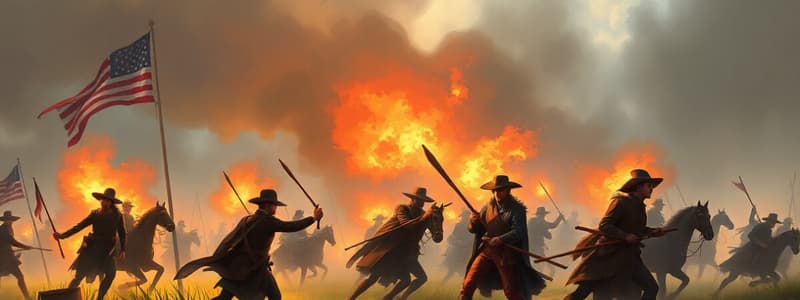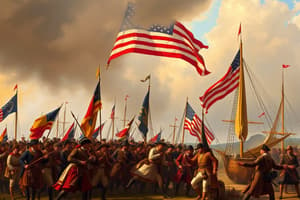Podcast
Questions and Answers
What was the primary cause of the Tripolitan War?
What was the primary cause of the Tripolitan War?
- Refusal to pay increased tribute (correct)
- Colonial ambitions in North Africa
- American trade expansion in the Mediterranean
- Alliance with European powers
What major conflict was fought over free trade and sailors' rights?
What major conflict was fought over free trade and sailors' rights?
- The First Seminole War
- The War of 1812 (correct)
- The Chesapeake incident
- The Panic of 1819
Which event signified a major financial crisis leading to widespread foreclosures in 1819?
Which event signified a major financial crisis leading to widespread foreclosures in 1819?
- The Panic of 1819 (correct)
- The Chesapeake incident
- The First Seminole War
- The War of 1812
Who warned leaders of nearby Fort Scott during the First Seminole War?
Who warned leaders of nearby Fort Scott during the First Seminole War?
What was a significant outcome of the War of 1812 regarding enslaved Africans?
What was a significant outcome of the War of 1812 regarding enslaved Africans?
What caused widespread removal of Indians after the War of 1812?
What caused widespread removal of Indians after the War of 1812?
Which president was in office during the election of 1808?
Which president was in office during the election of 1808?
What was one of the foundational issues leading to the Panic of 1819?
What was one of the foundational issues leading to the Panic of 1819?
Flashcards
Tripolitan War
Tripolitan War
Conflict between the U.S. and Tripoli (now in Libya) over tribute payments.
Chesapeake Incident
Chesapeake Incident
Highlighted American weakness, almost causing war.
War of 1812
War of 1812
War over trade and sailors' rights; Africans fought on both sides for freedom.
Panic of 1819
Panic of 1819
Signup and view all the flashcards
First Seminole War
First Seminole War
Signup and view all the flashcards
Thomas Jefferson
Thomas Jefferson
Signup and view all the flashcards
Andrew Jackson
Andrew Jackson
Signup and view all the flashcards
Treaty of Ghent
Treaty of Ghent
Signup and view all the flashcards
Study Notes
Antebellum America (1800-1825)
- Madison's Presidency (1808): Embargo Act repealed; Madison signed declaration of war against Great Britain.
- Thomas Jefferson: President during the beginning of the conflict.
- Shawnee: Native American tribe resisting white settlement in the Ohio Valley.
- Tenskwatawa: A Shawnee spiritual leader promoting resistance to white ways.
- Black Seminoles: Indigenous groups in Florida formed from escaped enslaved Africans who joined existing indigenous groups.
- General Andrew Jackson: Military leader involved in the conflict in Florida and later the Seminole wars.
- Tripolitan War: Conflict with Tripoli (now Libya) due to the US refusal to pay tribute. Conflict was sparked in 1801.
- Chesapeake Incident: Highlighted American weakness; near war situation.
War of 1812
- Cause: Dispute over free trade and sailor's rights. Also, some enslaved Africans chose to fight alongside the British.
- Outcome: Treaty of Ghent; no clear victor.
End of the War
- Treaty of Ghent: Agreement to end the war, but with no resolution on returning enslaved Africans, who had joined the British.
- Indians: Widespread removal of Native Americans from their land due to western expansion.
First Seminole War (1817-1818)
- Cause: US attacks in Florida; led to conflict.
- Conflict: Native American resistance to US westward expansion; conflict against Seminoles, who included escaped Africans.
- Result: Began in 1817 and resulted in the pushing back of the Seminoles.
Panic of 1819
- Causes: Widespread issues, including inflation, public debt from the War of 1812, and the Louisiana Purchase.
Missouri Compromise (1820)
- Purpose: To manage the expansion of slavery into new territories; balance free and slave states, prohibiting slavery in new Louisiana Purchase territories.
- Key Aspects: Missouri admitted as a slave state; Maine was admitted as a free state. Further expansion of this issue caused conflict between the North and the South.
Studying That Suits You
Use AI to generate personalized quizzes and flashcards to suit your learning preferences.
Related Documents
Description
Explore the pivotal events of Antebellum America from 1800 to 1825, including Madison's presidency and the War of 1812. This quiz covers key figures such as Thomas Jefferson, General Andrew Jackson, and the various indigenous groups affected by these conflicts. Test your knowledge about the causes and outcomes of this tumultuous period in American history.




